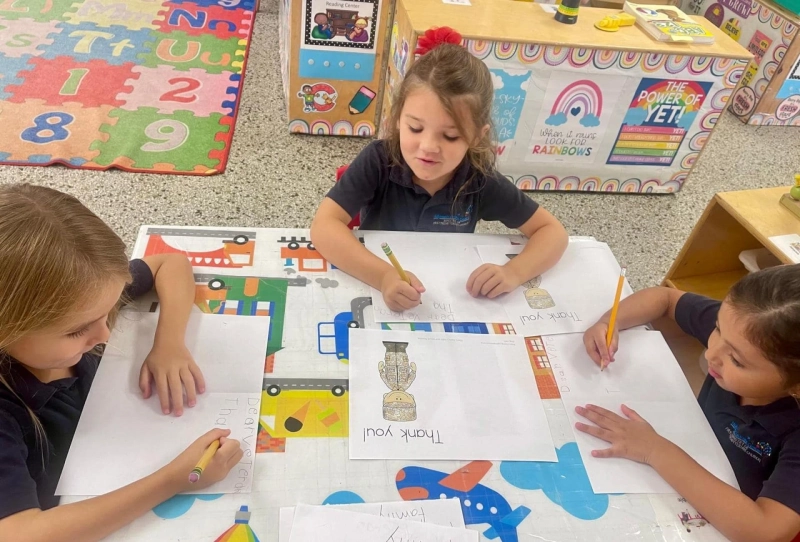Choosing a career path is a significant decision, and if you're passionate about making a difference in the foundational years of a child's life, then early childhood education (ECE) might be the perfect fit for you. Beyond the rewarding experience of nurturing young minds, an ECE course equips you with a unique and highly valuable set of skills. These skills not only prepare you for a successful career working with children but also enhance your personal development in profound ways.
At Hollywood Learning Centers, we believe in empowering our students with the knowledge and practical abilities to excel. Here are five essential skills you’ll gain from an early childhood education course:
1. Deep Understanding of Child Development:
An ECE course delves into the fascinating world of child psychology and development. You'll learn about the different stages of cognitive, social, emotional, and physical development from birth through to age eight.
- Why it's essential: This knowledge is crucial for creating age-appropriate activities, understanding children's behaviors, and providing the right kind of support to help them reach their full potential. You'll be able to identify developmental milestones and recognize when a child might need extra help or a different approach.
- How the course helps: Through a combination of theoretical learning, case studies, and practical application, you'll gain a comprehensive understanding of how children learn and grow.
2. Effective Communication and Interpersonal Skills:
Working in early childhood education means constantly interacting with young children, their parents, and fellow educators. Mastering communication is key.
- Why it's essential: You'll need to be able to explain concepts clearly to children, actively listen to their needs and concerns, and build trusting relationships. Equally important is the ability to communicate professionally and empathetically with parents, providing them with insights into their child's progress and addressing any queries they may have.
- How the course helps: ECE courses often include modules on communication strategies, active listening techniques, and conflict resolution, specifically tailored for interactions with both children and adults in an educational setting.
3. Patience, Empathy, and Adaptability:
Children are wonderfully unique, and their days can be filled with a whirlwind of emotions and energy levels. Working with them requires a special kind of patience and understanding.
- Why it's essential: Each child learns at their own pace and has their own individual needs. Empathy allows you to connect with children on their level and respond to their emotional cues effectively. Adaptability is crucial as no two days are the same; you'll need to be able to adjust your plans and approaches based on the children's moods and interests.
- How the course helps: Through hands-on experience and learning about diverse learning styles and temperaments, you’ll cultivate a patient and empathetic approach. You'll also develop the flexibility to modify activities and routines to best suit the needs of the children in your care.
4. Creative Problem-Solving and Curriculum Development:
Creating engaging and educational experiences for young children requires a spark of creativity and the ability to think on your feet.
- Why it's essential: You'll be responsible for designing and implementing lesson plans and activities that are not only fun but also foster learning and development across various domains – from literacy and numeracy to art and motor skills. This often involves finding innovative solutions to keep children engaged and address different learning styles.
- How the course helps: ECE programs emphasize play-based learning and provide you with the tools and techniques to develop creative curriculum content. You'll learn how to design stimulating learning environments and use everyday materials to create enriching activities.
5. Observation, Assessment, and Documentation Skills:
A significant part of an early childhood educator's role involves observing children to understand their progress, identify their strengths, and pinpoint areas where they might need more support.
- Why it's essential: Careful observation and accurate documentation are vital for tracking a child’s development, tailoring learning experiences to individual needs, and communicating effectively with parents and other professionals. These skills also play a key role in early identification of any potential learning difficulties.
- How the course helps: You’ll be trained in various observation techniques, learn how to conduct informal and formal assessments, and develop the skills to document children's learning journeys in a meaningful and professional way.
Invest in Your Future and Theirs
Embarking on an early childhood education course at Hollywood Learning Centers is more than just career training; it's an investment in your personal growth and in the future of the children you'll inspire. These five essential skills are just the beginning of what you'll gain. You'll also develop leadership qualities, teamwork abilities, and a deep sense of fulfillment that comes from making a positive impact during the most crucial years of a child's development.
Ready to take the next step? Contact Hollywood Learning Centers today to learn more about our Early Childhood Education programs and start your journey towards a rewarding and impactful career!


